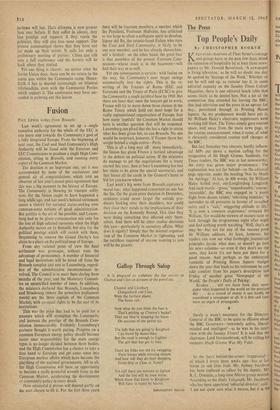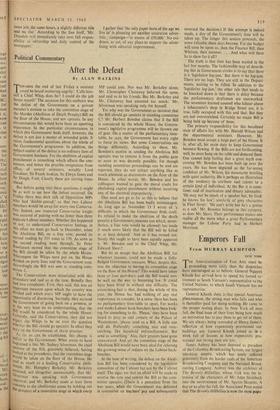The Press
Top People's Daily
By CHRISTOPHER BOOKER
KLEN-EYED observers of Fleet Street's comings and goings have, in the past few days, noted the extension of hospitality by at least three news- papers to Mr. Donald Baverstock. 'A newspaper is living television,' as he will no doubt one day be quoted by 'Sayings of the Week.' Whether or not he will end up, as rumour has it, in some editorial capacity on the Sunday Times Colour Magazine, there is one editorial lunch table that seems likely to be denied him. Not a jot of the commotion that attended his leaving the BBC, that had television and the press in an uproar for day:., percolated through to Printing House Square. As my predecessor would have put it, Sir William Haley's electronic suppressors were working full blast. The Times simply gave routine space, well away from the main news page, to the routine announcement, when it came, of what it obviously considered routine staff changes at the BBC.
But last Saturday two obscure, hardly influen- tial MPs put down a motion calling for the resignation of Sir Hugh Greene. Suddenly, for Times readers, the BBC was at last newsworthy; the story was given major prominence. The explanation was not far behind—on the editorial page opposite, under the heading 'Not So Much An Apology.' At last, in 400 words, Sir William Haley boiled over, out-Longfording Longford. And such words—'gross,' unpardonable,"coarse,' 'miserable; the BBC was engaged in 'a panic flight from decent values,' televising inanities,' a surrender to all pressures in favour of so-called satire and a "sick," sniggering attitude to life.' 'It is now a common experience,' revealed Sir William, 'for would-be viewers of mature taste to look through the programmes night after night and find nothing worth watching.' Well, that's as may be—but not for any of the reasons poor Sir William adduces. At least, however, his readers can now see what forthright journalistic principles decide what does or doesn't go into his news columns—so even if they don't sec the news, they know it's not been put there for a good reason. And perhaps as the embittered romantic of Printing House Square trudges down the year that leads to his retirement he can take comfort from his paper's description last Friday of another great 'Newspaper of the World,' the People's Daily of Peking:
Readers . . . will not learn from their news- paper what happened in the world on the previous day . . . as a record of events it can hardly be considered a newspaper at all. It is first and fore- most an organ of propaganda.
Surely it wasn't necessary for the Director- General of the BBC to be quite as effusive about the BBC Governors—'extremely active, liberal- minded and intelligent'—as he was in his inter- view with the Sunday Times? It is said that the chairman, Lord Normanbrook, will be calling his memoirs Hugh Greene Was My Valet.
So the Sun's behind-the-scene i 'reappraisa of which I wrote three weeks ago—has at last borne its sad little fruit. Mr. Sydney Jacobson has been replaced as editor by his deputy, M. R. L. Dinsdale, a long-time Mirror group veteran. According to the Daily Telegraph, Mr. Jacobson, who has been appointed 'editorial director,' said :
'lows '1 am not quite sure what it means, but it is the
same job, the same hours, a slightly different title and no rise.' According to the Sun itself, `Mr. Dinsdalc will immediately take over full respon- sibility ot editorship and daily control of the newspaper.'
I gather that 'the only paper born of the age we live in' is planning yet another saturation adver- tisir.:, campaign—'in excess of L50,000.' No evi- dence, as yet, of any plans to support the adver- tising with editorial improvement.



































 Previous page
Previous page